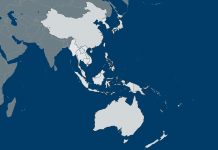Joining forces. British, Australian and U.S. leaders announced a new security partnership for the Indo-Pacific on Wednesday. The trilateral “AUKUS” program will focus on things like artificial intelligence and cybersecurity cooperation, as well as underwater defense capabilities. This last one is big, as the United States and the United Kingdom will apparently provide Australia with at least eight nuclear-powered submarines, ostensibly empowering Australia to play a much more robust role in any attempt to squeeze China in a conflict scenario along major maritime chokepoints across South and Southeast Asia.
Europe’s response. The deal also marks a death knell for Australia’s 34.5 billion-euro ($40 billion) fast-attack diesel submarine deal with France, which had already been on the rocks for a number of reasons. Paris seems none too happy about it. The French defense and foreign ministers issued a statement expressing regret about the decision and claiming that France’s exclusion from the agreement shows a lack of consistency, given the growing challenges coming from the Indo-Pacific region. The EU foreign affairs chief said the bloc was not informed about the new deal prior to its announcement. Embarrassingly, the agreement came a day ahead of the EU’s launch of its own new Indo-Pacific strategy.
China’s response. China, as could be expected, is none too pleased either. Chinese state media on Thursday cried foul about the new pact, despite it involving three countries that were already staunch allies, accusing them of double standards and other sins. Notably, Australian Prime Minister Scott Morrison offered Chinese President Xi Jinping an “open invitation” for talks following the announcement.
Israeli reversal. Israeli Defense Minister Benny Gantz said Israel might agree to a new U.S.-brokered nuclear deal with Iran, in an apparent shift from former Israeli Prime Minister Benjamin Netanyahu’s strong opposition to an agreement. On Wednesday, the Institute for Science and International Security said its analysis had determined that Iran had enough weapons-grade uranium to produce a single nuclear warhead within about a month.
IS leader killed. France said its troops in Mali killed the leader of Islamic State in the Greater Sahara. Abu Walid al-Sahrawi had claimed responsibility for a 2017 attack in Niger that killed four U.S military personnel. The U.S. had offered a $5 million reward for information leading to his capture.
Pyongyang’s new missiles. North Korea’s test launch Wednesday of a pair of short-range ballistic missiles showed the ability to fire missiles from a moving train. The missiles have limited usefulness, however. They don’t provide an obvious tactical advantage over North Korea’s many road-mobile launchers, since trains travel along highly predictable, fixed routes and can’t be hidden nearly as easily from enemy targeting systems. Meanwhile, Japan’s defense minister said the missiles splashed down inside the country’s exclusive economic zone. Relatedly, South Korea said it is developing a supersonic cruise missile.
Cutting off Russian gas. Poland said it would not renew a contract with Russian firm Gazprom for natural gas supplies. Warsaw plans instead to purchase gas from Norway starting in October 2022, when the Gazprom agreement expires.
Talking security. A summit of the heads of state of the Shanghai Cooperation Organization began in Tajikistan on Thursday. The security bloc, consisting of China, Russia and five South and Central Asian nations, is expected to discuss defense and development, as well as the situation in Afghanistan.






